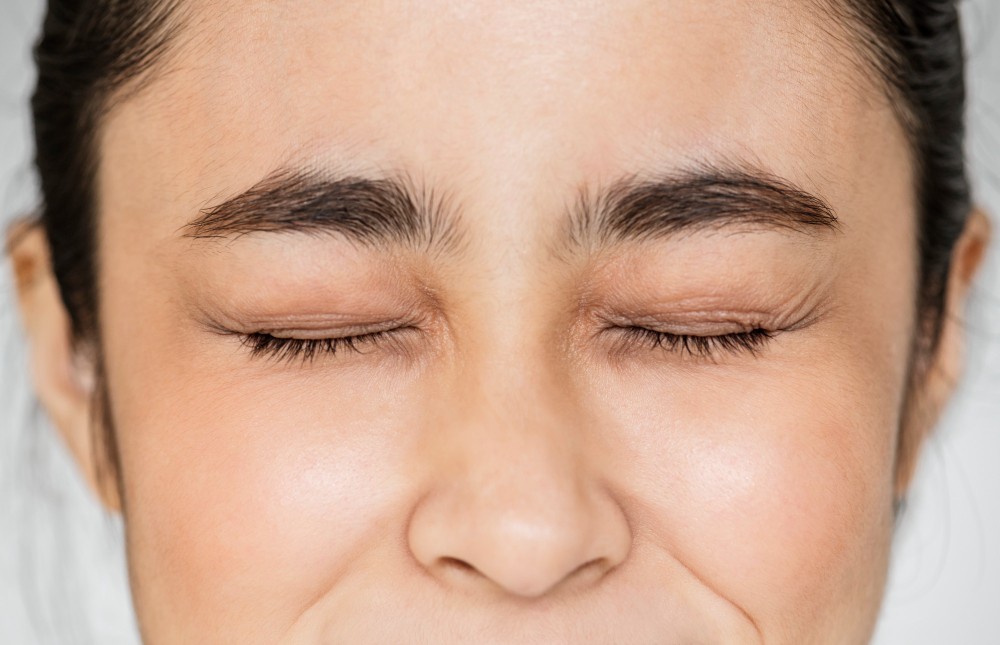Eczema in children, also known as atopic dermatitis, is a chronic condition that causes red, itchy, scaly rashes and dry skin.
The primary triggers of eczema include dry skin, irritation, stress, allergies, infections, hot weather, and sweat. Although not life-threatening, severe eczema can harm a child's health.
How to treat eczema in children
Eczema cannot be cured, but regular treatment can manage symptoms.
The following is a guide to treating eczema in children, including:
It is important to take a shower at the appropriate temperature.
Children with eczema need to bathe in warm water and avoid too hot water. Water that is too hot can remove natural oils from the skin, which makes the skin drier and more easily irritated.
Taking a short shower with warm water, around 10-15 minutes, also minimizes the risk of irritation, helps maintain a healthy skin balance and keeps the skin clean.
Applying a moisturizer
Regular moisturizer helps maintain skin moisture by forming a protective layer over the skin that prevents water loss. This is important because the skin of children with eczema tends to be drier and prone to losing moisture.
Dry skin can worsen eczema symptoms, including itching and inflammation. Choosing a moisturizer suitable for sensitive skin types is important, and it should not contain ingredients that may cause additional irritation. For skin types with eczema, you can choose a moisturizer made from aloe vera or oatmeal and avoid moisturizers that contain fragrances or very harsh chemicals.
Read more: Air Pollution Turns Out To Cause Gatal Eksim
Adjust the temperature in the room
Setting a comfortable room temperature and maintaining humidity are two important things that need to be done to treat skin with eczema. Dry air can cause the skin to become drier and more susceptible to eczema symptoms. Dry air also irritates children's sensitive skin.
On the other hand, a moist environment can help speed up the recovery of skin damaged by eczema. You can maintain a comfortable temperature and use a humidifier to maintain room humidity.
Choose cotton clothes
Cotton clothing is better for children with eczema than synthetic or wool materials. Cotton tends to be soft and comfortable on children's skin, especially sensitive skin due to eczema.
Cotton also has more breathable properties, allowing air and moisture to move freely. This can help keep skin dry and prevent excess moisture, which can irritate.
Cotton material can also absorb sweat well, prevent allergic reactions and is easy to wash and maintain.
Read more: Difference Between Eksim And Psoriasis
Selection of detergent
Detergents that contain fragrances or certain chemicals can irritate sensitive skin, especially children with eczema. Allergic reactions or detergent irritation can worsen eczema symptoms such as itching and redness.
To maintain the quality of your clothes and not cause allergy or eczema symptoms, you should choose a gentle and fragrance-free detergent.
Prevent scratching the skin
Itching tends to provoke children to scratch the skin. However, scratching irritated skin can cause the skin to have open sores and increase the risk of infection. Divert the child's attention from the itching with other activities such as reading books, watching films, playing, or doing other activities that the child likes.
You can also help reduce itching by applying a cold compress or moisturizing gel.
If your child is experiencing severe itching due to eczema symptoms or home remedies aren't effective, it's important to seek advice from a paediatrician or dermatologist for further treatment and care. You can also access health consultation services by downloading the Ai Care application from the App Store or Play Store.
Want to know more information about pregnancy, breastfeeding, and the health of women and children? Click here!
- dr. Yuliana Inosensia
Cleveland Clinic (2022). Eczema. Available from: https://my.clevelandclinic.org/health/diseases/9998-eczema
Mayo Clinic (2023). Atopic dermatitis (eczema). Available from: https://www.mayoclinic.org/diseases-conditions/atopic-dermatitis-eczema/symptoms-causes/syc-20353273
Boston Children's Hospital. Eczema. Available from: https://www.childrenshospital.org/conditions/eczema
Leslie Barrie (2022). The Right Way to Take a Shower or Bath When You’re Managing Eczema. Available from: https://www.everydayhealth.com/eczema/shower-tips-to-soothe-your-eczema.aspx
Vincent Iannelli, MD (2023). Dry Skin Treatments for Babies and Older Children. Available from: https://www.verywellhealth.com/childrens-dry-skin-pediatric-dermatology-2633476
Camerin Spahn (2021). 11 Tips to Prevent Dry Winter Skin. Available from: https://www.healthline.com/health/winter-dry-skin
Kristeen Moore (2022). Humidifiers and Health. Available from: https://www.healthline.com/health/humidifiers-and-health
Rachel Reiff (2023). Clothes Tips for Eczema. Available from: https://www.webmd.com/skin-problems-and-treatments/eczema/ss/slideshow-clothes-for-eczema
Leslie Barrie (2024). 8 Laundry Tips for People With Eczema. Available from: https://www.everydayhealth.com/news/are-your-clean-clothes-drying-your-skin/
Mayo Clinic (2024). Itchy skin (pruritus). Available from: https://www.mayoclinic.org/diseases-conditions/itchy-skin/diagnosis-treatment/drc-20355010












